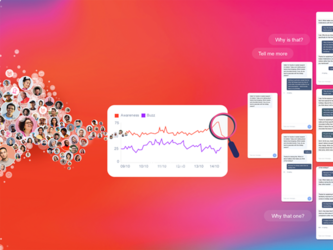Driven to frustration
Steve Jobs famously said, “We do no market research”, which seems to have inspired other companies to repeat the adage. In a recent TV advert, named ‘Design and Driving’, Peugeot appears to suggest that their car designs are not based on market research – which they have chosen to represent with huge piles of paper, stuffed full of charts.
Is that all there is to market research: just reams of dead trees, stuffed with data from hundreds and thousands of boring, ill-informed, ignorant consumers? I think not.
Market research is not piles of paper. It’s not charts and tables. It’s not focus groups nor surveys nor social listening nor communities. Market research is not techniques and processes. Market research is the application of brains to consumer and market information. Market research depends on smart and creative people who think, ponder, analyse, interpret, reject, rethink, and dispute. These people learn how to disregard stereotypes, tradition, and common knowledge, and focus only on what is real (or perceived to be real, as the case may be).
“Market research is not piles of paper. It depends on smart and creative people who think, ponder, analyse, interpret, reject, rethink, and dispute”
The other essential part of market research is, of course, the data. It comes in all forms – survey data, mobile phone data, focus group data, social media data, discussion group data, observational data, eye-tracking data, brain activity data, skin response data, historical data, financial data, secondary research data, and much more. Hey, why not print all that data on paper and stack it really high and messy on a desk if you want to pretend you live in pre-computer, pre-tablet, pre-environmentally conscious era. The point is that data without a thinker is just data, not market research.
So let’s design a car without market research. First, we need to find the most highly skilled and creative designer that has ever existed. And based on our “no market research” rule, this designer can never have seen automotive industry financials to know which car designs sell more units. This designer should also have never seen historical pictures or read biographies about Henry Ford and the trials and tribulations that he and his team went through while building the first cars. This designer has never observed a focus group discussing the cars they love, never reviewed survey data, and never observed people shopping for cars.
Over her lifespan, our designer has not personally observed millions of cars driving through the streets, has never observed which designs, sizes, lengths, details, and colours are more or less popular. Our designer has not witnessed thousands of car commercials, and has never gone to a car show where the newest and most innovative designs are surrounded and admired by hundreds or thousands of pointing, smiling consumers. Our designer has never listened to hundreds of friends, family, colleagues, and social media contacts whine, complain, rave about, and extoll the many features of their vehicles over the last 20 or 30 years. Indeed, this designer has never sat in a car, stood beside a car, or even seen a car to form her own personal N of 1 case study.
While our theoretical designer has not conducted any formal market research, as would be carried out by a well-respected market research firm, we can see that it would be impossible for her to design a car without carrying out informal market research. It might not meet the standards that our industry needs to generate higher validity and reliability, but it would still tick the box marked ‘research’ – a multi-mode, multi-year data collection methodology and the application of a human brain to data.
Perhaps, however, we could suggest a few things to our car designer. The market research industry has seen a revolution in data collection methods in the last few years; new methods that capture new kinds of data that innovative researchers have been using to their advantage.
A little bit of eye-tracking research might reveal that the slightly raised edge at the front of the hood repeatedly distracts the eye from the road.
A little bit of neuroscience might reveal that driver reaction times can be increased if the sound speakers are located at eye-level.
A little bit of social media text analytics might reveal that people don’t care if the vehicle was designed in France if it was actually made in India.
Facial coding might reveal that the artistically designed seam placement on the rear seat rubs angrily on the legs of 5 to 9-year-old children.
Big data might reveal that sales of specific designs fail miserably in a certain region.
And as for spreadsheets printed on mile-long sheets of perforated paper, brand new dashboards can now place the tiniest and largest pieces of data at the tip of our fingers, ready to inspire the next stunning insight.
Perhaps it’s time to rethink what market research really is.
Annie Pettit is vice-president of research standards at Research Now

We hope you enjoyed this article.
Research Live is published by MRS.
The Market Research Society (MRS) exists to promote and protect the research sector, showcasing how research delivers impact for businesses and government.
Members of MRS enjoy many benefits including tailoured policy guidance, discounts on training and conferences, and access to member-only content.
For example, there's an archive of winning case studies from over a decade of MRS Awards.
Find out more about the benefits of joining MRS here.













9 Comments
Duncan McCallum
12 years ago
Well said Annie. Maybe it's why Peugeot could only manage 24th place in the 2013 JD Power Customer Satisfaction Ratings survey!
Like Reply Report
James B
12 years ago
Excellent - I mentioned this ad in a post on research-live pre-Xmas, great to see a response! and a very thoughtful response too!
Like Reply Report
Sandra Pickering
12 years ago
Superb response, Annie. I am feeling a bit sorry for the excellent people who work in research and insights at Peugeot!
Like Reply Report
John Grono
12 years ago
If only they had have pre-tested it ...
Like Reply Report
Deepak
12 years ago
Brilliantly written article Annie.....
Like Reply Report
Pravin Shekar
12 years ago
Awesome Annie. An apt response, which I hope to (re)use in other fora/meetups!
Like Reply Report
Jules Berry
12 years ago
I suspect the dig at market research has little to do with Peugeot.and a lot to do with the ad agency / copywriters and their attitude to being researched
Like Reply Report
Annie Pettit
12 years ago
Thanks everyone for your kind words. Let's continue to spread the news of good research design!
Like Reply Report
Tracey Hill
12 years ago
Ironic - I've spent many a long hour working on customer satisfaction reports for Peugeot.
Like Reply Report